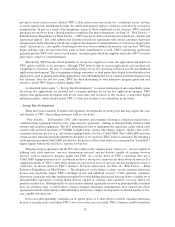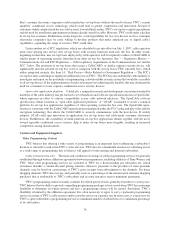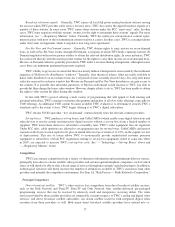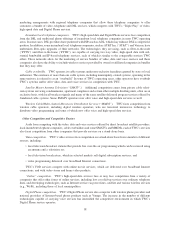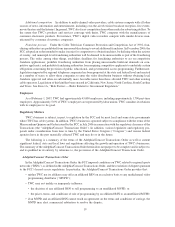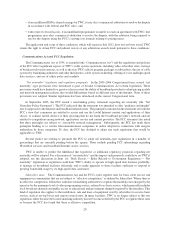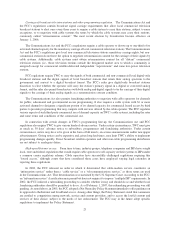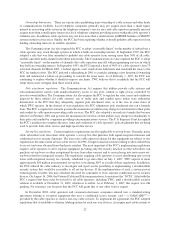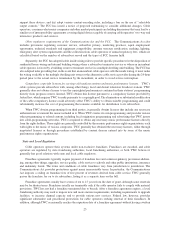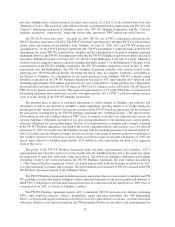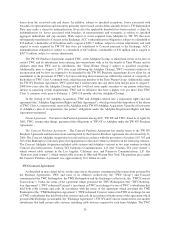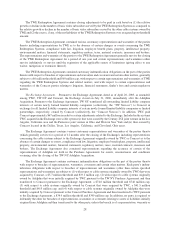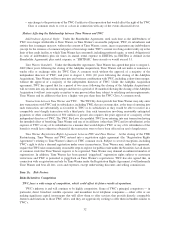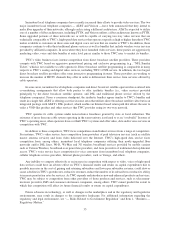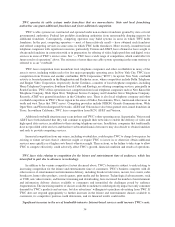Time Warner Cable 2006 Annual Report Download - page 29
Download and view the complete annual report
Please find page 29 of the 2006 Time Warner Cable annual report below. You can navigate through the pages in the report by either clicking on the pages listed below, or by using the keyword search tool below to find specific information within the annual report.renewal or extension, TWC generally has the right to continue to operate, either by agreement with the local
franchising authority or by law, while continuing to negotiate a renewal. In the past, substantially all of the material
franchises relating to TWC’s systems have been renewed by the relevant local franchising authority, though
sometimes only after significant time and effort. During 2006, in adopting new regulations intended to limit the
ability of local franchising authorities to delay or refuse the grant of competitive franchises (by, for example,
imposing deadlines on franchise negotiations), the FCC announced the adoption of a Further Notice of Proposed
Rulemaking that concluded tentatively that these new regulations should also apply to existing franchisees,
including cable operators, at the time of their next franchise renewal. The FCC indicated it would issue an order in
the Further Notice of Proposed Rulemaking within six months from release of the final order adopting the new
regulations applicable to new entrants. Despite TWC’s efforts and the protections of federal law, it is possible that
some of TWC’s franchises may not be renewed, and TWC may be required to make significant additional
investments in its cable systems in response to requirements imposed in the course of the franchise renewal process.
Local telephone companies may provide service as traditional cable operators with local franchises or they
may opt to provide their programming over unfranchised “open video systems.” Open video systems are subject to
specified requirements, including, but not limited to, a requirement that they set aside a portion of their channel
capacity for use by unaffiliated program distributors on a non-discriminatory basis. A federal appellate court
overturned various parts of the FCC’s open video rules, including the FCC’s preemption of local franchising
requirements for open video operators. The FCC has modified its open video rules to comply with the federal court’s
decision.
Regulation of Telephony
As of February 1, 2007, it was unclear whether and to what extent regulators will subject services like TWC’s
Digital Phone service (“Non-traditional Voice Services”) to the regulations that apply to traditional, circuit-
switched telephone service provided by incumbent telephone companies. In February 2004, the FCC opened a
broad-based rulemaking proceeding to consider these and other issues. That rulemaking remains pending. In
November 2004, the FCC issued an order preempting state certification and tariffing requirements for certain kinds
of Non-traditional Voice Services. The validity of this order has been appealed to a federal appellate court where, as
of February 20, 2007, a decision was still pending. The FCC has, however, issued a series of orders resolving
discrete issues. For example, in May 2005, the FCC adopted rules requiring Non-traditional Voice Service providers
to supply E911 capabilities as a standard feature to their subscribers and to obtain affirmative acknowledgement
from all subscribers that they have been advised of the circumstances under which E911 service may not be
available. In August 2005, the FCC adopted an order requiring certain types of Non-traditional Voice Services, as
well as facilities-based broadband Internet access service providers, to assist law enforcement investigations
through compliance with the Communications Assistance For Law Enforcement Act. In June 2006, the FCC
adopted an order making clear that Non-traditional Voice Service providers must make contributions to the federal
universal service fund. Certain other issues remain unclear, however, including whether the state and federal rules
that apply to traditional, circuit-switched telephone service also apply to Non-traditional Voice Service providers
and whether utility pole owners may charge cable operators offering Non-traditional Voice Services higher rates for
pole rental than for traditional cable service and cable-modem service. One state public utility commission, for
example, has determined that TWC’s Digital Phone service is subject to traditional, circuit-switched telephone
regulations.
The Transactions
The following provides a more detailed description of the Transactions and contains summaries of the terms of
the material agreements that were entered into in connection with the Transactions. This description does not
purport to be complete and is subject to, and is qualified in its entirety by reference to, the applicable agreements.
Agreements with ACC
As described in more detail below, under separate agreements (as amended, the “TW NY Purchase Agree-
ment” and “Comcast Purchase Agreement,” respectively, and, collectively, the “Purchase Agreements”), TW NY
and Comcast purchased substantially all of the cable assets of Adelphia. The Purchase Agreements were entered
24



